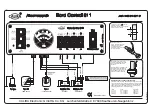
Six-Speed Automatic Transmission (1.4L Turbo
Engine Only — DDCT)
The transmission gear position display (located in the
instrument panel cluster) indicates the transmission gear
range. You must press the brake pedal and the lock
button on the gear selector to move the gear selector out
of PARK (refer to “Brake/Transmission Shift Interlock
System” in this section). To drive, press the lock button
on the front of the gear selector and move the gear
selector from PARK or NEUTRAL to the DRIVE position.
The electronically-controlled transmission provides a
precise shift schedule. The transmission electronics are
self-calibrating; therefore, the first few shifts on a new
vehicle may be somewhat abrupt. This is a normal
condition, and precision shifts will develop within a few
hundred miles (kilometers).
Only shift from DRIVE to PARK or REVERSE when the
accelerator pedal is released and the vehicle is stopped.
Be sure to keep your foot on the brake pedal when
shifting between these gears.
This transmission is programmed to prevent shifting
from REVERSE to DRIVE or DRIVE to REVERSE, if
vehicle speed is above 6 mph (10 km/h). This safety
feature helps protect your transmission from damage.
The transmission gear selector has PARK, REVERSE,
NEUTRAL, DRIVE, and AutoStick (+/-) shift positions.
Manual shifts can be made using the AutoStick shift
control (refer to “AutoStick” in this section for further
information). Toggling the gear selector rearward (+) or
forward (-) while in the AutoStick position (beside the
DRIVE position) will manually select the transmission
gear, and will display the current gear in the instrument
cluster as 1, 2, 3, etc.
440
STARTING AND OPERATING
Summary of Contents for 2016 Dart
Page 4: ......
Page 7: ...1 INTRODUCTION 5 ...
Page 10: ......
Page 77: ...Not Seated Properly Not Seated Properly 2 THINGS TO KNOW BEFORE STARTING YOUR VEHICLE 75 ...
Page 162: ...160 UNDERSTANDING THE FEATURES OF YOUR VEHICLE ...
Page 163: ...3 UNDERSTANDING THE FEATURES OF YOUR VEHICLE 161 ...
Page 164: ...162 UNDERSTANDING THE FEATURES OF YOUR VEHICLE ...
Page 201: ...Voice Tree 3 UNDERSTANDING THE FEATURES OF YOUR VEHICLE 199 ...
Page 216: ...Voice Tree 214 UNDERSTANDING THE FEATURES OF YOUR VEHICLE ...
Page 218: ...216 UNDERSTANDING THE FEATURES OF YOUR VEHICLE ...
Page 220: ...218 UNDERSTANDING THE FEATURES OF YOUR VEHICLE ...
Page 222: ...220 UNDERSTANDING THE FEATURES OF YOUR VEHICLE ...
Page 224: ...222 UNDERSTANDING THE FEATURES OF YOUR VEHICLE ...
Page 266: ...One Half Second Tone Slow Tone 264 UNDERSTANDING THE FEATURES OF YOUR VEHICLE ...
Page 267: ...Slow Tone Fast Tone 3 UNDERSTANDING THE FEATURES OF YOUR VEHICLE 265 ...
Page 268: ...Fast Tone Fast Tone 266 UNDERSTANDING THE FEATURES OF YOUR VEHICLE ...
Page 306: ......
Page 423: ...Operating Tips Chart 4 UNDERSTANDING YOUR INSTRUMENT PANEL 421 ...
Page 424: ......
Page 494: ...492 STARTING AND OPERATING ...
Page 586: ......
Page 647: ...MAINTENANCE SCHEDULES CONTENTS 䡵 MAINTENANCE SCHEDULE 646 Required Maintenance 647 8 ...
Page 654: ......
Page 666: ......
Page 667: ...INDEX 10 ...
















































